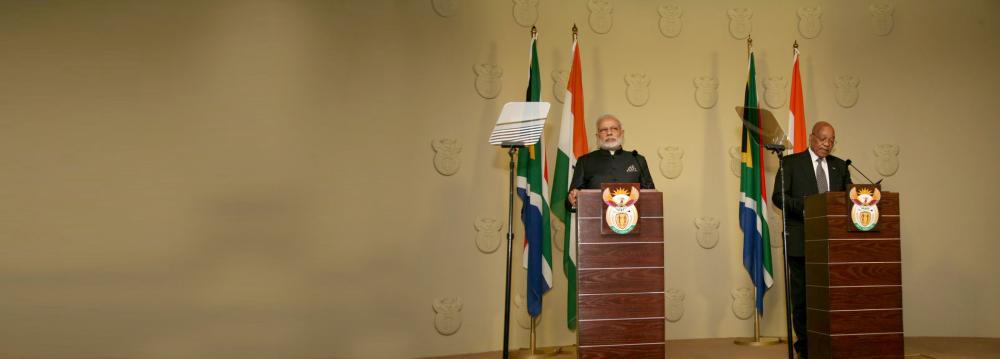Indian Prime Minister Narendra Modi arrived in South Africa on Friday as part of his five-day, four-nation Africa tour aimed at enhancing ties with those countries, particularly in the economic sphere.
The prime minister has already concluded the first leg of his tour in Mozambique. After South Africa, he will go to Tanzania and Kenya. During his South Africa visit, Modi will meet President Jacob Zuma and also Cyril Ramaphosa, the deputy president, businessstandard.com reported.
"My Africa tour, aimed at enhancing ties between India & Africa will begin from Mozambique in a brief but key visit," Modi tweeted ahead of his departure.
"My programs in South Africa will span across Pretoria, Johannesburg, Durban & Pietermaritzburg," he added.
India's globe-trotting premier's visit is considered as yet another charm offensive to promote his country's goods, services and investments, as well to as offset China's expanding influence on the resource-rich continent.
"This visit is about trade but it's also about investment and geopolitical connections," Anil Gupta, professor of strategy and globalization at the University of Maryland, was quoted as saying by CNBC.com.
Soft Power Position
India wants to be a maritime leader in the Indian Ocean and because these countries are strategically located on Africa's east coast, they are of great importance to New Delhi, Gupta explained.
India and Africa share deep historical ties dating back to colonial years and a two million-strong Indian diaspora on the continent places New Delhi in a significant soft-power position. But the world's number two economy, India's key economical rival in Asia, is now the dominant foreign power in Africa. Chinese investment and loans have flooded the continent, in sectors ranging from real estate to shipping, giving Beijing enormous diplomatic and military clout as well as a secure grip on the continent's commodity wealth, particularly energy.
As a result, India has been finding ways to counterbalance China's supremacy, particularly in the realm of development finance.
"India's development diplomacy for the continent has been through a strategic shift," Rajrishi Singhal, senior fellow of geoeconomics studies at Mumbai-based think tank Gateway House, said in a recent note.
The Indian Export-Import (Exim) Bank, a government-owned institution that finances and promotes foreign trade, exemplifies that transition, he explained.
The bank's credit disbursal strategy to Africa was long centered on infrastructure and industrial projects, which placed India in direct competition with China. But as Exim looks to ramp up its investments over the next three years, it's likely to focus more on service exports instead, Singhal noted.
Service exports include healthcare, education, and information technology services, areas that are India's traditional strengths in Africa that may give the former a unique advantage over Beijing. In May, Exim extended $10 billion in lines of credit for healthcare projects across the continent. About 40 % of Exim's total loan exposure is to Africa, local media reports said in 2015.
Focus on 'Project Exports'
"Exim is also looking to sharpen its focus on another area of Indian strengths in Africa: project exports," Singhal added, referring to the term used for overseas construction and engineering projects. "It has requested the Reserve Bank of India to ease regulatory and compliance guidelines regarding minimum equity capital, leverage and the maximum that the bank can lend to a single borrower."
Geopolitics aside, alternative energies will also feature prominently on Modi's agenda, as India aims to triple its use of renewable energy by 2030.
The four countries on his tour are part of the International Solar Energy Alliance, an initiative that New Delhi launched at the CoP21 Climate Conference in Paris last year, Gupta noted. Across his tour and especially in Tanzania, Modi is scheduled to meet with "solar mamas," local women trained by Indian non-government organization Barefoot College to become solar power engineers.
According to Economist.com, Modi aimed to deepen in Mozambique, where Indian oil firms are betting heavily on offshore gas. However, China's $220 billion of trade with Africa currently dwarfs India’s $70 billion, as the cash-rich Chinese government has lavished the continent with aid and investment. Modi is hoping that Indian soft power, plus the talents of its traders and entrepreneurs, will eventually overtake China’s state-driven efforts.


